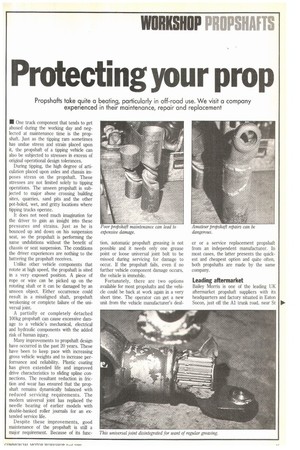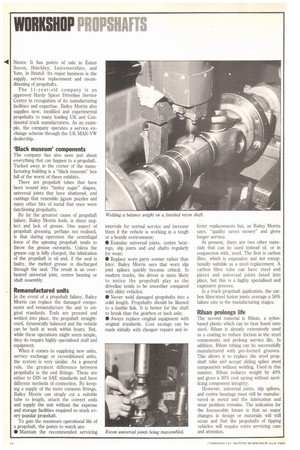Protecting your prop
Page 115

Page 116

If you've noticed an error in this article please click here to report it so we can fix it.
Propshafts take quite a beating, particularly in off-road use. We visit a company experienced in their maintenance, repair and replacement
• One truck component that tends to get abused during the working day and neglected at maintenance time is the propshaft. Just as the tipping ram sometimes has undue stress and strain placed upon it, the propshaft of a tipping vehicle can also be subjected to stresses in excess of original operational design tolerances.
During tipping, the high degree of articulation placed upon axles and chassis imposes stress on the propshaft. These stresses are not limited solely to tipping operations. The unseen propshaft is subjected to major abuse crossing building sites, quarries, sand pits and the other pot-holed, wet, and gritty locations where tipping trucks operate.
It does not need much imagination for the driver to gain an insight into these pressures and strains. Just as he is bounced up and down on his suspension seat, so the propshaft is performing the same undulations without the benefit of chassis or seat suspension. The conditions the driver experiences are nothing to the battering the propshaft receives.
Unlike other vehicle components that rotate at high speed, the propshaft is sited in a very exposed position. A piece of rope or wire can be picked up on the rotating shaft or it can be damaged by an unseen object. Either occurrence could result in a misaligned shaft, propshaft weakening or complete failure of the universal joint.
A partially or completely detached 100kg propshaft can cause excessive damage to a vehicle's mechanical, electrical and hydraulic components with the added risk of human injury.
Many improvements to propshaft design have occurred in the past 20 years. These have been to keep pace with increasing gross vehicle weights and to increase performance and reliability. Plastic coating has given extended life and improved drive characteristics to sliding spline connections. The resultant reduction in friction and wear has ensured that the propshaft remains dynamically balanced with reduced servicing requirements. The modern universal joint has replaced the needle bearing of earlier models with double-banked roller journals for an extended service life.
Despite these improvements, good maintenance of the propshaft is still a major requirement. Because of its ftmc tion, automatic propshaft greasing is not possible and it needs only one grease point or loose universal joint bolt to be missed during servicing for damage to occur. If the propshaft fails, even if no further vehicle component damage occurs, the vehicle is immobile.
Fortunately, there are two options available for most propshafts and the vehicle could be back at work again in a very short time. The operator can get a new unit from the vehicle manufacturer's deal er or a service replacement propshaft from an independent manufacturer. In most cases, the latter presents the quickest and cheapest option and quite often, both propshafts are made by the same company.
Leading aftermarket
Bailey Morris is one of the leading UK aftermarket propshaft suppliers with its headquarters and factory situated in Eaton Socon, just off the Al trunk road, near St Neots: It has points of sale in Eaton Socon, Hinckley, Leicestershire, and Yate, in Bristol. Its major business is the supply, service replacement and reconditioning of propshafts.
The 11-year-old company is an approved Hardy Spicer Driveline Service Centre in recognition of its manufacturing facilities and expertise. Bailey Morris also supplies new, modified and experimental propshafts to many leading UK and Continental truck manufacturers. As an example, the company operates a service exchange scheme through the UK MAN-VW dealership.
'Black museum' components
The company has also seen just about everything that can happen to a propshaft. Tucked away in the corner of the manufacturing building is a "black museum" box full of the worst of these exhibits.
There are propshaft tubes that have been wound into "barley sugar" shapes, universal joints that have shattered, end castings that resemble jigsaw puzzles and many other bits of metal that once were functioning propshafts.
By far the greatest cause of propshaft failure, Bailey Morris feels, is sheer neglect and lack of grease. One aspect of propshaft greasing, perhaps not realised, is that during operation the centrifugal force of the spinning propshaft tends to throw the grease outwards. Unless the grease cup is fully charged, the lubrication of the propshaft is nil and, if the seal is faulty, the melted grease is discharged through the seal. The result is an overheated universal joint, centre bearing or shaft assembly.
Remanufactured units
In the event of a propshaft failure, Bailey Morris can replace the damaged components and remanufacture the unit to original standards. Ends are pressed and welded into place, the propshaft straightened, dynamically balanced and the vehicle can be back at work within hours. But, while these operations might seem simple, they do require highly specialised staff and equipment.
When it comes to supplying new units, service exchange or reconditioned units, the system is very similar. As a general rule, the greatest difference between propshafts is the end fittings. These are either to DIN or SAE standards and have different methods of connection. By keeping a supply of the more common fittings, Bailey Morris can simply cut a suitable tube to length, attach the correct ends and supply the unit without the expense and storage facilities required to stock every popular propshaft, To gain the maximum operational life of a propshaft, the points to watch are: • Maintain the recommended servicing intervals for normal service and increase them if the vehicle is working in a tough or a hostile environment; • Examine universal joints, centre bearings, slip joints and end shafts regularly for wear; • Replace worn parts sooner rather than later. Bailey Morris says that worn slip joint splines quickly become critical. In modern trucks, the driver is more likely to notice the propshaft play as the driveline tends to be smoother compared with older vehicles; • Never weld damaged propshafts into a solid length. Propshafts should be likened to a fusible link. It is better for the shaft to break than the gearbox or back axle; • Aways replace original equipment with original standards. Cost savings can be made initially with cheaper repairs and in ferior replacements but, as Bailey Morris says, "quality saves money" and gives longer service.
At present, there are two other materials that can be used instead of, or in conjunction with, steel. The first is carbon fibre, which is expensive and not exceptionally suitable as a steel replacement. A carbon fibre tube can have steel end plates and universal joints fused into place, but this is a highly specialised and expensive process.
In a truck propshaft application, the carbon fibre/steel fusion joints average a 50% failure rate in the manufacturing stages.
Rilsan prolongs life
The second material is Rilsan, a nylonbased plastic which can be heat fused onto steel. Rilsan is already extensively used as a coating to reduce friction in the steel components and prolong service life. In addition, Rilsan tubing can be successfully manufactured with pre-formed grooves. This allows it to replace the steel propshaft tube and accept sliding spline steel components without welding. Used in this manner, Rilsan reduces weight by 40% and gives a 30% cost saving without sacrificing component integrity.
However, universal joints, slip splines, and centre bearings must still be manufactured in metal and the lubrication and wear problem remains. The indication for the foreseeable future is that no major changes in design or materials will still occur and that the propshafts of tipping vehicles will require extra servicing care and attention.








































































































































